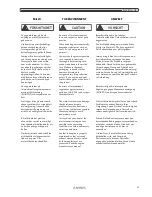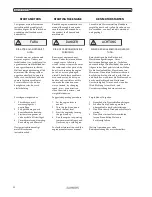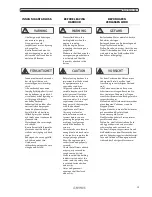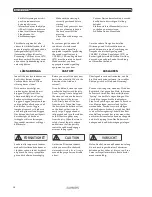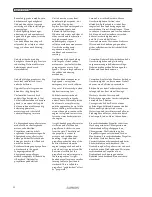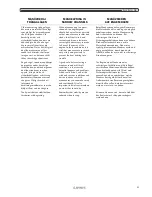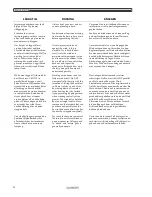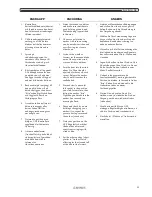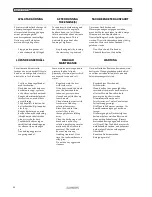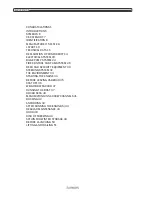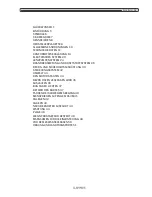
Ryds Båtar AB
43
ANKRA UPP
ANCHORING
ANKERN
1
Kontrollera
bottenförhållanden i sjökortet
och försäkra er om att ankaret
kan få fäste och att ankring är
tillåten i området.
2
Välj din ankringsplats med
omsorg, se till att du inte
hindrar trafik eller kommer
att svänga för nära andra
båtar.
3
Lyssna på
väderleksrapporten för
området och ta hänsyn till
förväntade vind- våg- och
tidvattenförhållanden.
4
Kör fram båten till en punkt
3-5 båtlängder övanför den
punkt där du vill att båten
ska ligga för ankar. Släpp ut
ankaret tills det når bottnen.
5
Backa sakta (på tomgång) till
den punkt där du vill att
båten ska ligga och ankaret
“bita” ordentligt. Sträck linan
och lägg fast den vid en
förtöjningspollare.
6
Avvakta och kontrollera att
båten inte draggar eller
driver. I annat fall får
ankringsproceduren göras
om enligt ovan.
7
Notera din position med
hjälp av GPS. Kontrollera
regelbundet att båten inte
flyttat sig.
8
Aktivera ankarlarmet
(Anchor Watch) på ekolodet/
sjökortsplottern. I områden
med tidvatten, ställ in
tolerans för
tidvattenvariationer.
1
Study the seabed conditions
and make sure that there is
good holding ground, and
that anchoring is permitted
in the area.
2
Choose your location to
anchor with care, ensuring
you do not obstruct channels
or will swing too close to
other boats.
3
Listen to the weather
forecast for the area and take
note of the expected wind,
wave and tide conditions.
4
Face the boat into the wind
about 3 to 5 boat lengths
upwind of where you wish
to rest. Release the anchor
slowly until it reaches the
sea/lake bed.
5
Proceed slowly astern [at
idle speed] to the position
you wish to remain in, thus
letting the anchor “bite”.
Tighten up and make fast the
anchor line securely to a
mooring bollard.
6
Pause and check if you are
drifting or dragging your
anchor: if so, repeat the
process, having recovered
the anchor [see above].
7
Note your position on the
GPS. Regularly check that
the boat has not moved,
apart from swinging with
wind or tide.
8
Set the echo sounder / chart
plotter to "Anchor Watch",
allowing for the rise and fall
of the tide in tidal waters.
1
Studie des Meeresbodens Bedingungen
und stellen Sie sicher, dass es gut ist,
halten Boden, und die Verankerung in
der Umgebung erlaubt.
2
Wählen Sie Ihre Verankerung Lage mit
Sorge, stellen Sie sicher, dass Sie nicht
behindern Kanäle oder schwingt zu
nahe an anderen Booten.
3
Hören Sie sich die Wettervorhersage für
die Gegend und nehmen zur Kenntnis,
der zu erwartenden Wind-, Wellen und
Gezeiten.
4
Legen Sie das Boot in den Wind ca. 3 bis
5 Bootslängen auf den Wind, wo Sie zur
Ruhe. Lassen Sie den Anker bis zum
Meer / See Bett erreicht.
5
Gehen Sie langsam achtern [in
Leerlaufdrehzahl], um die gewünschte
Position zu bleiben, so lassen die Anker
"Biss". Ziehen Sie und ziehen Sie die
Ankerleine sicher an einem
Vertäuungspoller.
6
Warten Sie und prüfen Sie, ob Sie
treiben, wenn ja, wiederholen Sie den
Vorgang, nachdem wieder die Anker
[siehe oben].
7
Ihre Position mithilfe von GPS
eintragen. Regelmäßig kontrollieren, ob
sich die Position nicht verändert hat.
8
Das Echolot / Plotter auf "Ankerwache"
einstellen.





